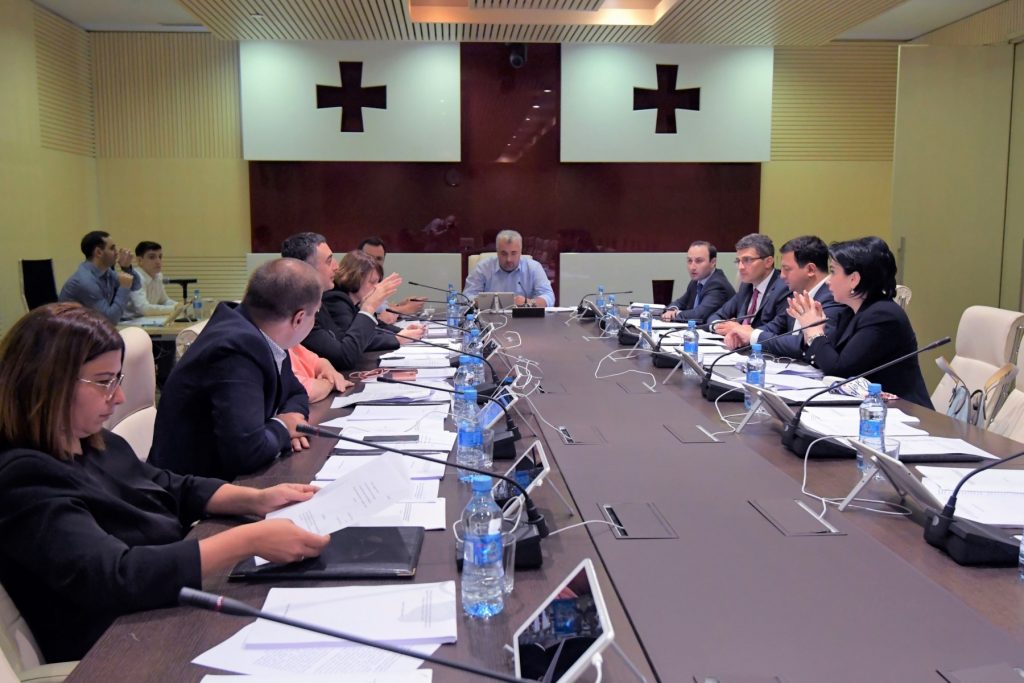The interim parliamentary commission leading the probe into the investigation of the controversial teen murder in Tbilisi, which left two 16 year-olds – Davit Saralidze and Levan Dadunashvili – stabbed to death, concluded its three-month work on September 5.
Two conclusions were presented at the final commission sitting yesterday – one by the opposition European Georgia party, which had the majority in the commission, and another one by the ruling Georgian Dream-Democratic Georgia party.
Both documents were put to vote before the MPs, with the commission adopting the draft submitted by the European Georgia. The adopted conclusion obtained nine votes in favor and four against, while the alternative draft garnered four votes in favor and nine against.
The EG conclusion contains 32 recommendations on the murder case investigation. Among others, it requests that the Prosecutor’s Office launches criminal persecution against Mikheil Kalandia, one of the case witnesses, for his participation in the murder of Davit Saralidze.
The document says Kalandia actively participated in the incident and had an unidentified item at hand during the fight, which could have been used as an instrument of murder.
The commission conclusion also calls on the authorities to launch investigation into the role of Mirza Subeliani, a former employee of the Prosecutor’s Office, who is the father of one of the fight participants and an uncle of Mikheil Kalandia.
It said despite the fact that Subeliani left the position shortly after the incident, he continued maintaining close communication with those carrying out the investigation and made an arrangement with them. The authors believe this led to tendentious results and helped conceal some elements of the crime, including over the role of Subeliani’s son and nephew.
The commission then calls for the resignation of the case investigators and prosecutors, as well as of Interior Minister Giorgi Gakharia for his “premature and unjustified” remarks of December 4 that “all participants of the crime were identified and arrested,” and of Justice Minister Tea Tsulukiani for her public statement that the former chief prosecutor should not have resigned.
The document tasks the Interior Ministry and the Prosecutor’s Office to submit a report within one month on the progress of the commission recommendations implementation.
The alternative conclusion, drafted by the ruling party, stresses that “certain actions” during the investigation “were either missing or were carried out with delays,” but adds that it has not affected the overall results of the investigation.
The GDDG conclusion underscores that problems identified in the investigation process cannot be attributed to individual public servants and officials, but rather to “the flawed system of investigation,” which does not allow for “clear division of prosecutorial and investigative functions.”
The document also stresses that no evidence has been found proving that the process “was obstructed on political grounds or by any of the state agencies,” and that allegations that Mirza Subeliani enjoyed immunity from the authorities was not substantiated.
The GDDG conclusion also says there are “certain questions” on the role of Mikheil Kalandia in the murder of Saralidze, but notes that the Commission is not authorized to determine his guilt or instruct respective authorities to launch criminal proceedings against him.
Zaza Saralidze, father of murdered Davit Saralidze, who has been calling for detaining Kalandia, slammed the GDDG conclusion in a press briefing on September 6, saying their conclusion confirmed that the ruling party “are protecting those who murdered my son and who falsified the investigation.” He also said he would resume protests on September 10.
Background
The two 16 year-olds – Davit Saralidze and Levan Dadunashvili – were stabbed to death last December in a fight of about fifteen high school students near the prestigious 51st school in Tbilisi, in the very center of the city.
Two teenagers were arrested over the murder, but the court acquitted both suspects on group murder charges of the former, bolstering the existing doubts of the victim’s family that the Prosecutor’s Office had concealed some elements of the crime.
The court decision on May 31 prompted mass protests across the country, with several thousand protesters, including students, public figures and opposition politicians, demanding Chief Prosecutor Irakli Shotadze’s resignation.
Shotadze resigned later on May 31, but the protests continued and moved in front of the old Parliament building in Tbilisi, where their demands radicalized and included the resignation of then Prime Minister Giorgi Kvirikashvili’s government.
On June 11, Zaza Saralidze decided to temporarily suspend the solidarity rallies, while two days later Kvirikashvili announced his resignation.
This post is also available in: ქართული (Georgian) Русский (Russian)

